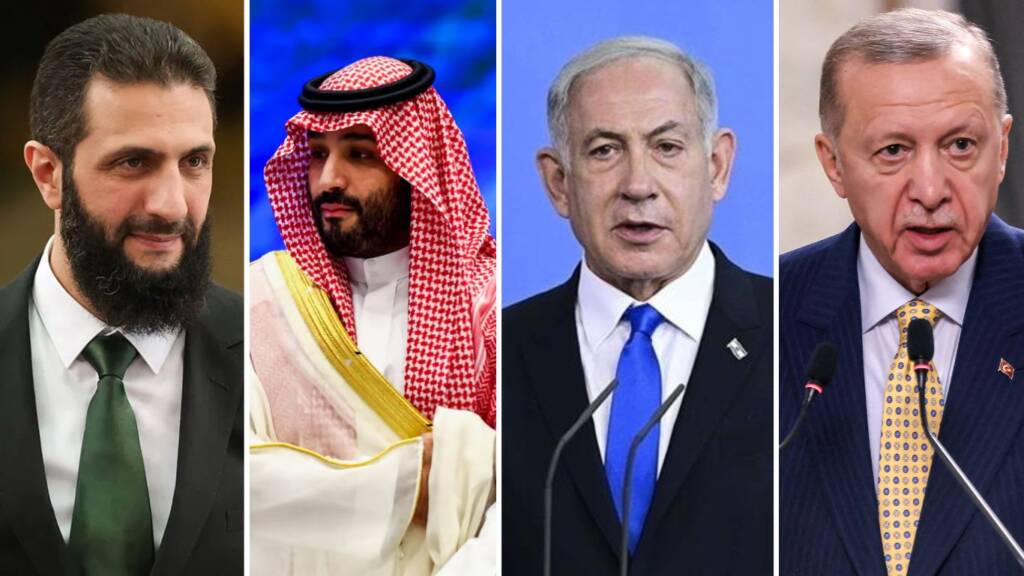On February 2, Ahmad al-Sharaa, better known for his nom de guerre Abu Mohammad al-Jolani, who was named president for the “transitional period” on January 29, visited the Kingdom of Saudi Arabia along with his Foreign Minister Asaad al-Shaibani. This is the first official foreign visit of Al-Sharaa since assuming office. Syrian interim president was warmly welcomed in Riyadh by Mohammed Abdel Rahman, the deputy emir of the Riyadh region. The visit came just after Saudi Arabia’s Foreign Minister, Prince Faisal bin Farhan, visited Damascus.
According to the official Saudi news agency SPA, Al-Sharaa met with Mohammad Bin-Salman, known as MBS, regarding bilateral relations and regional issues. Both leaders discussed “the latest developments in Syria and explored ways to support its security and stability.” After meeting MBS on February 2, Syria’s interim president Ahmed al-Sharaa said Saudi Arabia had a “genuine desire” to support his war-torn country.
“We held a long meeting during which we felt and heard a genuine desire to support Syria in building its future,” Al-Sharaa was quoted as saying in a statement on Telegram.
Meanwhile, the official Saudi Press Agency said that Prince Mohammed and Al-Sharaa discussed “ways to support the security and stability of sisterly Syria” and “ways to strengthen bilateral relations.”
If we closely observe the statements, we can see Saudi Arabia mentioning Syria as a “sisterly” nation, which means Saudi Arabia is ready to take the required responsibility for Syria, which is a massive shift in the politics of the region.
West Asia as a region has gone through a major geopolitical recalibration since last year. The intensified engagement between the two Sunni-majority nations has become a matter of analysis to understand recent developments. It can be understood through the lens of national interest. For Syria, Saudi Arabia is a potential regional ally that can not only help Syria’s reconstruction but also spread a perception of the legitimacy of the new Syrian government in the region. For Saudi Arabia, Syria, a Sunni majority country, may prove to be a regional ally, and at the same time, it will increase its presence in the Levant region.
The visit is also a sign of Al-Sharaa’s effort to garner regional and international legitimacy and attract Arab cooperation by addressing the concerns of major players in the Arab world, such as Saudi Arabia, the UAE, and Egypt. Last month, when Saudi Arabia’s Foreign Minister, Prince Faisal bin Farhan, visited Syria said the Kingdom was engaged in talks with the US and European partners to help lift economic sanctions imposed on the Syrian Arab Republic that have left the country’s economy decimated.
This means that Saudi Arabia is going to play a major role in West Asia, especially in Syria, and might mutually help both nations. Saudi Arabia has comparatively good relations with the West, which might help Syria in reconstruction, eliminating sanctions and bringing legitimacy globally, which is imperative for the new government to build a new Syria.
Also Read: Syrian leader Al Julani: From terrorist to poster boy
Iran’s influence in the region has already waned due to its direct and indirect confrontations with Israel, a US ally. The fall of Assad also crippled Iranian influence and pushed them for their own security. Russian presence in Syria has also weakened after the Assad fall. Russia pulled some military troops and decreased military infrastructure from Syria.
The US, under Donald Trump, is also considering troop withdrawal from Syria. Israeli media reported that senior White House officials informed Israel of Trump’s plan to pull US forces. Trump confirmed the pulling of troops from Syria on January 31. Hence, Saudi Arabia will automatically become the major player in Syria, and the new government will have no problem knowing its current requirements. Israel is also interested in the country, but their engagement is more about securing the immediate border by creating more extended buffer zones and destroying the Syrian military establishment, which they have already done.
Turkey’s involvement and interest in Syria are more complex. It varies from refugees to Kurdish militia to have its influence on Syria for regional ambitions. However, Turkey’s posture is more aggressive due to its national security, which has historically been threatened by Kurdish militia from Syria. At the same time, due to the civil war followed by the heavy crackdown by the Assad regime, Turkey faced a huge number of migrants on its soil. Turkey too is vying to assert its influence over the region and take over the void left by Iran. After Al-Sharaa’s visit to Saudi Arabia his next destination seems to be Turkey where he is expected to to discuss a joint defense pact, including establishing Turkish airbases in central Syria and training for Syria’s new army.
The fast evolving geo political situation of West Asia is drawing particular global attention. With Israel, Turkey and Saudi Arabia in a tight race to make hay while the sun shines and occupy as much space as possible as Tehran continues to retreat. Al-Sharaa is making sure that Syria gets the best possible deals from its neighborhood while also looking to protect his country’s sovereignty. With the regional situation so complex and fluid the fast changing landscape of West Asia continues to remain a minefield.
